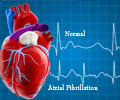Eating more nuts each week can help lower the risk of developing the atrial fibrillation (irregular heart rhythm) also known as heart flutter, reveals a new study.
- Eating many servings of nuts each week can help lower the risk of developing atrial fibrillation (irregular heart rhythm)
- Nuts are rich in healthy fats, minerals, and antioxidants. All these are heart healthy.
To explore this angle in detail, the research team used the completed Food Frequency Questionnaire responses and lifestyle information from over 61,000 Swedish 45-83 year olds. Their heart health was tracked for 17 years, till the end of 2014 or until death, whichever came first.
Findings of the study
People who ate nuts regularly were:
- better educated had healthier lifestyles
- less likely to smoke
- less likely to have high blood pressure
- ate more fruit and vegetables
- 4983 heart attacks, of which 917 were fatal
- 3160 cases of heart failure
- 7550 cases of atrial fibrillation
- 972 cases of aortic valve narrowing
- 983 abdominal aortic aneurysms (a bulge or swelling in the aorta, a major artery)
- 3782 cases of stroke caused by a blood clot (ischaemic)
- 543 caused by a brain bleed (intracerebral haemorrhage)
However, when many risk factors were accounted for, mainly lifestyle, general diet, diabetes, and family history, only links with atrial fibrillation and with heart failure emerged.
For heart failure, the findings were less consistent. They were moderate, but not high, and weekly nut consumption was associated with a 20 percent lower risk.
Nuts are rich in healthy fats, minerals, and antioxidants. All these are heart healthy.
"Nut consumption or factors associated with this nutritional behavior may play a role in reducing the risk of atrial fibrillation and possibly heart failure," the research team observed.
"Since only a small proportion of this population had moderate (about 5%) or high (less than 2%) nut consumption, even a small increase in nut consumption may have large potential to lead to a reduction in incidence of atrial fibrillation and heart failure in this population."the research team suggested.
Source-Medindia
















